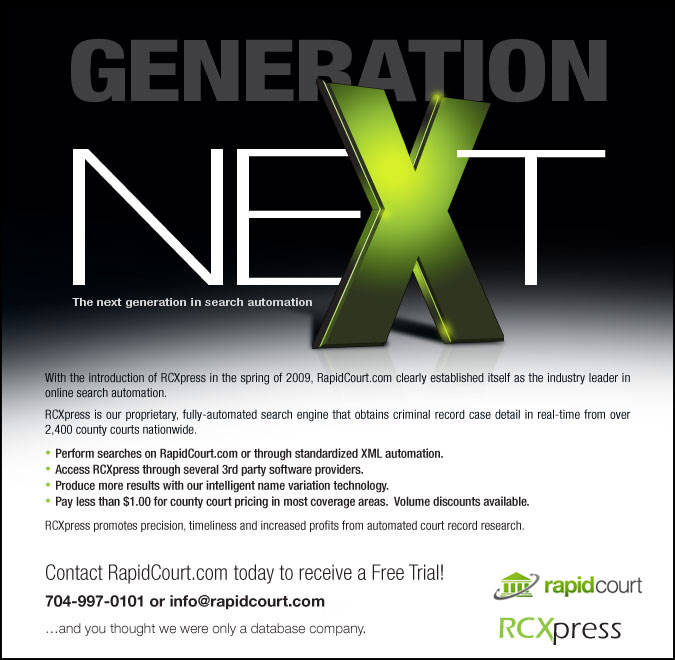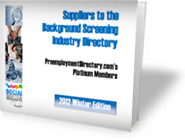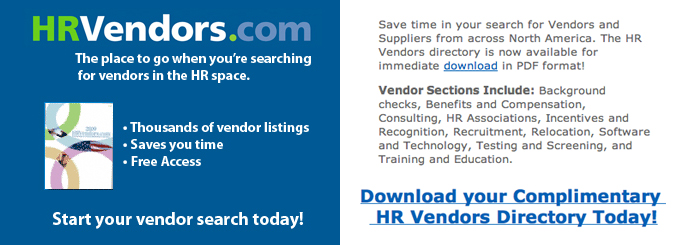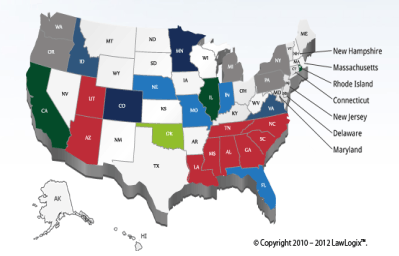| BACKGROUND
SCREENING NEWS |
Though
Not Yet Banned, Requiring Social Media Information Is a Bad
Idea
Employers
continue to wrestle with the issue of whether to require employees
and prospective employees to divulge their social media passwords.
Some critics of the practice, including Owen Kerr of George
Washington University Law School, have asserted that surrendering
a Facebook password is like handing over a key to a home.
So far,
few courts have issued decisions that provide any guidance about
the legality of seeking social media login information from
employees or prospective employees. In Pietrylo v. Hillstone
Restaurant Group, 2009 U.S. Dist. LEXIS 88702 (D.N.J. Sept.
25, 2009), a federal trial court case in New Jersey, the plaintiffs
were restaurant employees who belonged to a chat group. Access
to that group required an invitation and then a member's MySpace
account and password. One of the restaurant's managers asked
another restaurant employee for her login information for the
chat group, which the employee provided. The plaintiffs brought
a civil suit against the restaurant, claiming (among other things)
that the managers had violated the Stored Communications Act
(SCA). The jury found in favor of the plaintiffs and awarded
them, collectively, $3,403 in compensatory and punitive damages.
California,
Ilinois, Maryland and New Jerseyhave active legislative efforts
to regulate employers'collection and use of login information
regarding social media sitesand federal law may follow. In the
meantime, however, the practice currently is not prohibited.
Even so, employers should refrain from doing so.
To read
more click here

Prisoner
Reentry, Employment, Signaling, and the Better Identification
of Desisters
Prisoner reentry remains one of the most critical social
problems confronting America, one that brings with it many social
and economic costs. The mass incarceration that has occurred
in recent decades has resulted in 1.6 million individuals currently
in state and federal prisons with approximately 730,000 inmates
released annually. More than two thirds will be re-arrested
within 3 years of release. The fact that ex-prisoners face challenges
upon release, which contribute to these adverse outcomes, creates
substantial cause for concern for the well being of these individuals
and for the communities to which they return. Policy makers
and researchers have responded to the problem through a plethora
of new policies and programs and an increasingly large body
of research on prisoner re-entry. Successful efforts to promote
large-scale improvements in prisoner re-entry require more information
about effective programs and policies, but such efforts depend
heavily on accurate information about the factors that give
rise to the types of successful re-entry experiences that benefit
ex-prisoners and, in turn, society.
To read more, click
here

Details
on FTC Recommendation of Legislation to Address Practices of
Information Brokers
On March
26, 2012 the Federal Trade Commission (FTC) issued its report,
"
Protecting Consumer Privacy in an Era of Rapid Change: Recommendations
for Businesses and Policymakers ." In a
previous blog post we provided an overview of the report
and noted that one of the five "action items" highlighted
by the FTC in the report is to focus on the practices of information
brokers and "data brokers." Most notably, the FTC
calls on Congress to consider enacting targeted legislation
to provide greater transparency for, and control over, the practices
of information brokers and to allow consumers to access their
data maintained by information brokers. The FTC notes in the
report that Congress could model any such legislation on
H.R. 2221 (the "Data Accountability and Trust Act")
, a bill that the House passed during the 111th
Congress, as well as similar bills introduced in the 112 th
Congress.
To read
more click here

Felonbook.Com
Gives Criminals A Social Network Of Their Own
Americans
with criminal records now have their own online community -
felonbook.com. Mr. X (con), the sites' anonymous creator, had
the idea for felonbook while serving a federal prison term.
He looks "to give personal power back to those with a criminal
history" by encouraging users to think about how to better their
situation and change "the system." "This is done when an individual
member of the community creates a Group, gives details about
something he or she would like to change, and then through discussions
'sell' their plan to the Group. Game Changer plans, if approved
by the Community can get financial support.
To read
more click here

Facebook,
Lawmakers Warn Employers Not to Demand Passwords
Facebook
and lawmakers have warned employers against requesting Facebook
passwords while screening job applicants, a controversial practice
that underscores the blurring distinction between personal and
professional lives in the era of social media. The practice
has reportedly grown more commonplace as companies increasingly
regard profiles - or embarrassing photos from wild nights out
- as windows into a prospective employee's character. In some
cases, job applicants were asked to browse through their Facebook
accounts with an interviewer present. Facebook Inc's Chief Privacy
Officer, Erin Egan, says the social networking company could
"initiate legal action" against employers that demand Facebook
passwords. Democratic Sens. Chuck Schumer of New York and Richard
Blumenthal of Connecticutare asking Attorney General Eric Holder
to investigate whether employers asking for Facebook passwords
during job interviews are violating federal law, and lawmakers
in several states say they are willing to introduce bills to
prohibit this behavior. Opponents also warn employers they may
be setting themselves up for legal issues regarding invasion
of privacy and discrimination. "Employers have legitimate questions
about a person's job performance, but they can get that information
the regular way, without cutting corners and violating people's
privacy," said Leland Yee, a California state senator.
To read more,
click here



Washington State Governor Sign 'Fair Tenant Screening'
Bill
Washington
State has laws like the landlord - tenant act that address housing
discrimination. But some landlords find ways to get around the
mandates, until now.
On March
15, 2012 Governor Christine Gregoire signed the 'Fair Tenant
Screening Act' which forces landlords to make public details
about potential tenants collected in screening reports. The
reports could be misleading about an applicants past, such as
their income, disability or domestic violence.
To read
more click
here

Tenant
Background Check: Ideas for Property Managers
It is crucial to use a tenant background check to filter
rental candidates. Landlords have the right to defend their
personal property from undesirable tenants by confirming identification,
credit history profile, verifying issuance monitor reports and
knowing about previous evictions. However, there is more to
tenant background checks than just a criminal record. The best
tenant background checks can be attained from a vendor that
provides a thorough personal track record of the applicant that
consists of all relevant authorized information for the two
civil and criminal court docket documents.A criminal information
verification can help reassure property managers that their
house and property will not be abused, however tenant background
screening companies offer these for an additional cost. Make
sure you inform all future tenants that they are required to
go through a tenant screening process and answer questions about
previous landlords.
To read more, click
here

Innovative
Enterprises Launches FirstAAlert™ Real-Time Criminal
Incident Service
Innovative
Enterprises, Inc., a strategic partner to the background screening
industry and expert provider of court research information products,
smart data solutions and ancillary services, today introduced
the official release of FirstAAlert™, a unique core service
powering an emerging suite of products designed to provide the
earliest insight into criminal incident information currently
available in the commercial screening market.
FirstAAlert™
utilizes more than 3,000 interfaces with law enforcement agencies
across the country to access real-time arrest information, along
with tens of millions of historical incarceration and booking
records representing nearly three quarters of the jail population.
FirstAAlert™ is updated within minutes of booking through
an integrated agency, providing the most timely insight into
criminal incident information currently available.
"FirstAAlert™
knows about an arrest within minutes," stated Clifford J. Williams,
Innovative's Vice President and Chief Operating Officer. "The
suite of solutions we are building out around this core service
will provide actionable intelligence to our partners in a way
that is simply not possible with today's marketplace solutions
and will help us to deliver on our mission of building safer
workplaces and communities."
The FirstAAlert™
product family is available to qualified entities through Innovative's
carefully-selected network of Screening Industry Partners™.
To read
more click here

Connotate
Acquires Fetch to Meet Enterprises' Growing Demand for Big Data
Aggregation
On March
6, 2012 Connotate, Inc.,
the leading provider of solutions that help organizations monitor
and collect data and content from the Web, today announced that
it has acquired Fetch Technologies, the leader in making Web
data accessible and useful for the enterprise. Combining two
leaders in the data aggregation space with a shared vision enables
the company to quickly broaden its footprint and meet the growing
demand for solutions that monitor and aggregate real-time Web
data; delivering any data from any site any time in a structured
format."With a common philosophy of leveraging the value
of Web data to the modern enterprise and kindred technologies,
Connotate and Fetch coming together will strengthen the company's
overall market position while creating innovations that customers
will love," said Liam Donohue, Co-Founder and Managing
Director of .406 Ventures and Connotate Chairman.
"Fetch
is very excited to combine our information extraction, integration,
and data analytics solution with Connotate's monitoring, collection
and analysis solution," said Ryan Mullholland, Fetch's
former CEO and now President of Connotate. "Our similar
product and business development histories, but differing go-to-market
strategies creates an extraordinary opportunity to fast-track
the creation of world-class proprietary 'big data' collection
and management solutions."
To read
more click here

LawLogix
Wins Silver Stevie® Award for Customer Service Department
of the Year
LawLogix'
winning entry was based on a 121% increase in client contacts
in 2011, due largely to a growing client base in both its I-9
Compliance and
Immigration Case Management product lines. LawLogix attributes
this continued growth to its knowledgeable customer support
representatives who receive ongoing training in immigration,
I-9, and E-Verify topics to better serve and understand client
needs. This substantial knowledgebase enables LawLogix to deliver
top-notch service and resolve most client issues on the very
first call.
"We
take great pride in providing our clients with the best, most
thorough U.S based customer support out there," said Dan
Siciliano, Co-founder of LawLogix. "LawLogix continues
to grow in the I-9, E-Verify, and immigration software market
through our relentless commitment to hands-on client support.
We are honored to be recognized for our commitment to customer
service."
To read
more click
here

Innovative
Enterprises Launches AssuredTenant™ Comprehensive
Resident Screening Solution
Innovative
Enterprises, Inc., a strategic partner to the background screening
industry and expert provider of court research information products,
smart data solutions and ancillary services, today introduced
the official launch of AssuredTenant ™, a comprehensive
resident screening solution for property owners and managers
serving the multi-family housing market.
" AssuredTenant
™ fulfills my vision of arming screening professionals
with a superior resident screening solution that overcomes the
limitations of current market offerings," stated William J.
Bollinger, Innovative's Executive Vice President. " AssuredTenant
™ is the largest compilation of actionable landlord-tenant
records of its kind and will prove to be an invaluable tool
for our Screening Industry Partners™ and the property
management communities they serve."
AssuredTenant
™ is available to qualified entities through Innovative's
carefully-selected network of Screening Industry Partners ™.
To locate a partner , please visit http://www.knowthefacts.com
.
To read more click
here

PRIVACY
KNOWLEDGE = BETTER EMPLOYMENT DECISIONS
 Get the education you need at the
IAPP Canada Privacy Symposium 2012 Get the education you need at the
IAPP Canada Privacy Symposium 2012
Today,
it's crucial for everyone touching personal data to stay on
top of developments in privacy, not just the privacy and data
protection officers at the organization. And there's no better
place to get up-to-date on the Canadian privacy landscape than
at the
IAPP Canada Privacy Symposium 2012 in Toronto May 9-11,
where you'll hear about the use of social media in the workplace,
online behavioral advertising, freedom of information in the
Canadian public sector, recent legislative activity and how
it may impact your organization and much more. Don't miss this
opportunity to advance your knowledge and take your practice
to the next level at the Symposium.
Register now !

FRS
Partners with The National Student Clearinghouse, Builds Integrated
Solution for Educational Degree Verification
FRS, powered by Imagination Technologies, today announced it
has partnered with The National Student Clearinghouse to create
an integrated technology platform that streamlines education
and degree verification searches for The Clearinghouse’s
online users. This integrated platform will help The Clearinghouse
clients – in need of educational verification for background
screening – to continue to access the information they
need online, but in a more efficient manner at a reduced overall
cost.
To read more click here

| Welcome
to the U.S. Legal Challenge Question! |
Sponsored By:


As the background
screening industry continues to get more competitive the firms
that will ultimately succeed will be those that create competitive
advantage through their people by offering continuous learning
opportunities to heightened their knowledge and capabilities.
We believe that having employees that are very knowledgeable about
the legal landscape of background screening is essential to continued
success.
We are grateful
to Pam Devata, Seyfarth Shaw
LLP for providing the expertise for this valuable endeavor.
For information regarding the answers to the Legal Challenge Questions,
please contact Pamela Devata at Seyfarth Shaw LLP at pdevata@seyfarth.com
or 312-460-5000 or visit www.seyfarth.com.
Please choose
your answer by clicking on it:

Most 2011
Cyberattacks Were Avoidable
Despite rising concern that cyberattacks are becoming increasingly
sophisticated, hackers used relatively simple methods for the
vast majority of data breaches in 2011, according to a report
compiled by Verizon. In fact, 97% of the data breaches could have
been easily avoided using basic protection. Verizon's annual report
also found that in 80% of attacks, hackers hit victims of opportunity
rather than companies they sought out. The findings suggest that
while companies are spending increasing sums of money on sophisticated
new security controls, they are also continuing to overlook fundamental
security precautions. Very often, the companies breached had no
firewalls, had ports open to the Internet or used default or easily
guessable passwords. In addition, the report found that 85% of
victim companies were mostly in the retail, hospitality and food
services industries.
To read more,
click here

| OCCUPATIONAL
FRAUD AND DATA PROTECTION, PRIVACY |
New Study
Offers Tips to Combat 'Sweethearting'
A first-of-its-kind study on "sweethearting"--a form of employee
theft when the employee gives away products or services for free
or at a discount--claims traditional mitigation strategies used
by loss prevention professionals often don't work. The study's
authors approached sweethearting from a marketing perspective,
aiming to expose the "dark side" of the practice that hadn't been
previously studied. Employee theft and fraud costs U.S. companies
$600 billion each year and it is believed sweethearting is responsible
for 35% of companies' annual profit losses in the retail sector.
Sweethearting differs from the traditional definition of employee
theft in that the thieving employee takes all the risks and breaks
the law without any direct gain. The indirect benefits come in
the form of increased tips, increased social status, and "tit-for-tat"
agreements. The study found that without taking the motivations
behind sweethearting into account, currently used techniques such
as register tracking systems and video surveillance, would not
serve as deterrents. Two suggested strategies for combating sweethearting
include: making sure employee training includes an ethics component,
and pre-employment screening for the following three personality
traits: personal ethics, need for social approval and general
risk taking.
To read more, click
here

ALERT!
How to spot a FAKE degree
A recent
research has estimated that the fake degree industry is worth
over Rs. 12,000 crores worldwide. In case of India, the UGC maintains
a list of fake universities, but it does not provide you the list
of online fakes. We requested Dr.John Bear, the world renowned
authority on online degrees, to explain to our readers how to
spot a fake degree grading institution. There is no unanimity
on what a degree mill is. No one denies that a 'university' operating
from a mailbox service, selling diplomas to anyone, no questions
asked, is a mill. But what if there were a requirement of one
month of study and a 10-page thesis? Six months of study, 50 pages?
Two years of study and 200 pages? Would it be still a fake university?
A survey
of dozens of definitions of 'degree mill' found five relevant
factors in determining school legitimacy:
- What degree-granting
authority has it?Amount of work required
- Quality
of work required
- Process
for awarding credit for prior learning
- Credentials
of people who make decisions
Thus a degree
mill can be defined as an entity in which:
- Degree-granting
authority does not come from a generally-accepted government
agency;
- Procedures
for determining the amount and quality work do not meet generally-accepted
standards; and
- People
making these decisions do not have relevant credentials, training,
or experience.
To read more
click
here



Watching
the Private Eye: A Bill to Regulate Private Investigators
HB80, a bill
regulating the licensing, education and requirements to be a private
investigator, has passed out of the House Governmental Affairs
Committee and will now go before the full House for approval.
The bill will require private investigators in the sate of Alabama
to be licensed, tested and approved by a board that the HB80 will
create. Presently, Alabama has no laws that oversee, regulate
or offer any standard to become a private investigator. Everyone
who has a business license to be a private investigator currently
will be grandfathered in, but it will only allow those who have
had a business license for five consecutive years be considered
for the board. There are a few exceptions to the bill such as
CPAs that do forensic accounting. Proponents of the bill believe
that the sensitive information that private investigators acquire
should only be in the hands of licensed professionals.
To read more, click here

Proposed Law Would Expand FBI Background Checks of Private Security
Officers
A bill recently
introduced in the House of Representatives would allow employers
to use authorized third-party screeners to conduct FBI background
checks on private security officers when such checks are not available
from the employer's state. The bill--H.R. 4112, the Private Security
Officer Screening Improvement Act--would amend the Private Security
Officer Employment Authorization Act. Jeff Flint, NASCO's executive
director, points out the gap in the existing law that requires
state agencies to conduct background checks on behalf of employers,
but that many states still do not provide. "The [amended
law] will dramatically increase availability of FBI criminal background
checks for all private security officers," said Flint. "And
that will make the public safer."
To read more,
click
here

Manpower Report Says U.S. Employers Plan to Add Jobs
Next Quarter
Manpower
announced its second-quarter employment index climbed to 10 percent,
the highest level since late 2008, from 9 percent in the previous
three months on a seasonally adjusted basis. That marked a second
consecutive gain. An improving job market puts Americans in a
better position to increase spending, which accounts for about
70 percent of the economy. At the same time, rising gas prices
are weighing on household budgets and may lead to fewer purchases
of non- essential items in coming months. "Positive hiring
intentions tell us that employers are seeing increased demand
for their products and services, and that is good news for the
labor market," Jonas Prising, president of the Americas for
Milwaukee-based Manpower, said in a statement. "Although
we are not out of the woods yet, our data shows that this hiring
progression is increasingly solid."
Manpower
interviewed more than 18,000 employers in the U.S. The survey
is conducted quarterly, and the margin of error for U.S. data
is plus or minus 0.6 percent.
To read more
click here

States
Hardest Hit by Housing Collapse Lead U.S. Jobs Recovery
Arizona,
California, Florida and Nevada -- the states that were most hurt
in the real estate collapse over the past five years -- are now
leading the U.S. labor market expansion. The four states added
222,100 jobs from August through December, accounting for 28 percent
of the increase in U.S. employment in that period, according to
Labor Department figures. Their outperformance may continue, say
economists at Moody's Analytics Inc. and IHS Global Insight.
To read more
click here

STOP
STRUGGLING WITH WRITING AND PUBLISHING YOUR NEWSLETTER: |

We can help
you have a high quality e-newsletter to help nurture your relationship
with your clients and attract new clients. Our customized newsletter
service will take over your newsletter task or create a new one
for you. We can manage the creation of your newsletter for you.
We are constantly
researching information to use for The Background Buzz and
you can put our research to use for you. Using the information
rich content from The Background Buzz (minus the ads
and competitors information) we will create a custom newsletter
for you.
Use your staff’s
time to do more valuable work and save all the hassle of researching
or writing articles, formatting and managing all the other ezine
tasks with our customized ezine process.
Contact Barry
Nixon at 949-770-5264 or at wbnixon@aol.com
for more information.

Public
Record Update
Sponsored by:

Public
Record Update
by Mike Sankey
|
Pending New Jersey Bill Will Increase
Many Court Fees |
NJ Bill A763 was passed by the NJ State Assembly and now
is making its way to the State Senate. In general, the
bill contains fee increases that include (but are not
limited to) the fee to file motions (papers) in the courts;
the recording of judgments or orders in the Special Civil
Part; the fee to affix a seal, or certify a copy or for
an exemplification; and the fee to file a lien. The bill
also authorizes the Judiciary to fund a statewide digital
e-court information system which would include public
access to digital court records. Indication from the bill's
primary sponsor is the Senate and the Governor both favor
the bill's current language. If and when signed, the new
law would take affect July 1, 2012.For more information,
visit the state's legislative site at www.njleg.state.nj.us/ and search
for bill number A763.

| San
Luis Obispo County, CA |
San
Luis Obispo County, CA
Per
PRRN Member Judith Smith, the Executive
Director of the San Luis Obispo Superior Court - Ms. Susan
Matherly - has simply had enough. Ms. Matherly has had
it with all the public record search firms hired by employers
to check criminal records of local residents that apply
for jobs. On March 14th she announced at a local Bar Association
luncheon that she was shutting down the public access
terminal to background screening firms. And on Monday
March 19th she did it. The IT staff removed the public
access computer and put it in a locked room to be accessible
only by attorneys and their investigators.
To
better understand Ms. Matherly's logic, consider the following
summarized statements she also made at the March 14th
luncheon, as reported by Ms. Smith:
-
Public access information was never intended for background
screeners. Background screening companies just make
people not get hired.
-
Employers shouldn't be using background screening companies,
but rather should be using the DOJ/LiveScan [the FBI].
-
There are penal codes stating that the type of research
that background screening researchers are doing is illegal.
[But she refused to mention what these laws are.]
-
Background screening companies and researchers are not
trained to know what they are doing.
-
There is no identifying information in the computer
to know if a researcher has indentified the correct
person. [Note: The terminal does display a full name
and the DOB.]
At
present according to Judith Smith, MsMatherly has instructed
the Superior Court Clerks to do the following:
-
Only attorneys and their investigators now have access
to the locked room where the public access computer
with access to the public records now resides.
-
Clerks are not allowed to provide dockets to anyone
except to the defendant or their attorney of record.
-
Record searchers may only provide clerks with 10 names
a day.
-
Clerks may only provide very limited information (for
free) if there is only one recent case. Only data provided
are the case #, violation and disposition date, the
charge and disposition for convictions. If a charge
was dismissed the clerk will not inform the requester.
Also, no information is provided on sentencing or parole
violations. However, the researcher can obtain this
information for a $15.00 fee.
-
If a subject name has more than one case, the clerks
will only provide the case numbers. The researchers
then must order each file to review for a $15.00 fee
per case.
For
those interested:
Judith
Smith can be reached at Judie@jhsmithconsulting.com.The
presiding judge and Ms. Matherly's supervisor is Judge
Barry LaBarbera.
Ms.
Matherly can be reached at:
Ms.
Susan Matherly
Executive Director, Superior Court
1050 Monterey Street
San Luis Obispo, CA 93408
susan.matherly@slo.courts.ca.gov
805-781-5421

|
Florida
Aims to be First to Test Public Workers
A new extension
of Florida's drug-testing law now allows agency heads to randomly
test public workers for illegal drugs, prescription drugs, and
alcohol, but it exempts the governor and state legislators. This
is a first-in-the-nation move that lawmakers from other states
may copy, even as labor unions, civil libertarians, and small-government
advocates rail against it.Florida already tests welfare recipients
for drug and alcohol abuse. Under the law, agency heads are allowed
(but not required) to randomly test up to 10 percent of their
workforce every three months. Supporters say the measure is intended
to give workers who have drug problems a way to get clean, while
at the same time protecting the broader citizenry from impaired
public servants.No state yet requires those collecting unemployment
to undergo drug testing, but Arizona, Oklahoma,Georgia, and Utah
are among those considering it. The US Department of Labor now
allows states to require drugs tests for unemployment recipients
whose job search is confined to industries that already require
drug testing, such as aviation.
To read more,
click here

Drug Rules
for Commercial Motor Vehicle Drivers Updated
The Federal
Motor Carrier Safety Administration ("FMCSA") has published another
final rule, which is now in effect. This rule addresses the drug
use of commercial motor vehicles drivers, and the FMCSA aims to
eliminate inconsistencies in at least three areas. First, the
final rule amends the physical qualifications for commercial motor
vehicle ("CMV") drivers to clarify that drivers may not, under
any circumstances, use Schedule I drugs (drugs and substances
on the DEA's controlled substance schedules) and be qualified
to drive a CMV. Secondly, the FMCSA have replaced the term "actual
knowledge" throughout certain sections with the word "knowledge,"
clarifying that the relevant prohibitions refer to the knowledge
of test results, not employer observation of prohibited conduct.
Lastly, the final rule makes their regulation consistent with
DOT-wide drug and alcohol testing rules by including pre-employment
and return-to-duty testing as additional prohibitions to drivers
refusing to submit to post-accident, random, reasonable suspicion,
or follow-up drug or alcohol tests.
To read more, click here

Consistent
Application of Zero Tolerance Drug Policy Trumps Wrongful Termination
Claim
In Martin, et al. v. Quick Chek Corporation, et al.,
the New Jersey Appellate Division affirmed a trial court decision
and held that Quick Chek's consistent application of its zero
tolerance drug policy constituted a legitimate, non-discriminatory
basis for its decision to terminate Erik W. Martin's employment.
The plaintiff, who suffers from Parkinson's disease, filed suit
alleging wrongful termination and disability discrimination when
he was fired for failing a drug test. At the time of the drug
test, Martin had been taking a non-prescription medication for
a back injury he had sustained at work, unrelated to his disease.
The court found that Quick Chek terminated Martin's employment
pursuant to an extremely strict drug test, and that Martin failed
to demonstrate that Quick Chek's stated reason for the termination
(i.e. Martin's failed drug test) was a pretext for discrimination.
This decision demonstrates not only the importance of having employment
policies, such as drug abuse policies, but also the importance
of administering the policies in a consistent manner.
To read more,
click here

| NAPBS
ANNUAL CONFERENCE SESSION |
The Canadian
Privacy Landscape Is Different!
 Canadian privacy laws are markedly
different than those in the United States. Unlike the United States,
Canada has comprehensive privacy laws that cover all aspects of
personal information handling including both the public and private
sector. An important point to understanding is that Canadian laws
are based on 10 privacy principles. These include: being accountable,
identifying the purpose for the collection, collecting only that
which is necessary, obtaining consent, limiting use and disclosure,
safeguarding the information, keeping the information only for
as long as necessary, begin open and transparent about what you
do with the information, and providing a mechanism for people
to challenge your information handling practices. Canadian privacy laws are markedly
different than those in the United States. Unlike the United States,
Canada has comprehensive privacy laws that cover all aspects of
personal information handling including both the public and private
sector. An important point to understanding is that Canadian laws
are based on 10 privacy principles. These include: being accountable,
identifying the purpose for the collection, collecting only that
which is necessary, obtaining consent, limiting use and disclosure,
safeguarding the information, keeping the information only for
as long as necessary, begin open and transparent about what you
do with the information, and providing a mechanism for people
to challenge your information handling practices.
Lastly, Canadian
laws are enforced by Privacy Commissioners who have powerful rights
of investigation. Some argue that their enforcement sanctions
are not as severe as in some European countries, but there is
a movement afoot in Canada to add monetary fines for non-compliance.
And, just because an organization may be located outside of Canada
does not mean that they don't have to comply. The Federal Court
of Canada has already ruled that Canadian privacy laws extend
beyond the borders and must be followed by any organization dealing
with the personal information of Canadians.
To read more
click
here and also attend the Canadian Privacy and Data Protection
Session at the NAPBS Conference



Workplace
Homicides Still a Threat
On a Friday
morning in January, a man walked into the McBride Lumber Co. warehouse
in Star, N.C., and, armed with a 12-gauge shotgun, began firing
away, killing three people and seriously wounding another before
fleeing the scene and then shooting himself. The local sheriff's
department says the shooter was an employee at the lumber warehouse
and had -- prior to the shooting -- written a six-page letter
in which he expressed rage at his Hispanic co-workers, whom he
felt were making fun of him.
It was one
more episode in what has seemed like an endless cycle of workplace
shootings over the years. And yet, according to Violence in
the Workplace, a recent analysis of Bureau of Labor Statistics
data by the National Council on Compensation
Insurance , work-related homicides and injuries
due to workplace assaults are down dramatically from their levels
in the mid-1990s.
Homicides
still account for 11 percent of workplace fatalities, according
to the NCCI, with men accounting for a disproportionate share
of the victims: 85 percent of workplace homicide victims in 2009
were men, even though they account for just 53 percent of the
employed population. "The people most likely to be victims of
workplace homicides are those who are out in front, working late
hours, dealing directly with the public" says Plansky, who previously
served as deputy criminal justice coordinator for the mayor of
New York and an assistant district attorney with the Manhattan
DA's office.
To read more
click
here

One
Site! Many Suppliers! |
Looking
for the Top Suppliers in the Industry? Need to find a new Supplier?
Visit our VENDOR
SHOWCASE which features suppliers to the Background
Screening Industry.
Winter
2012 Directory of Suppliers to the Background Screening Guide
Coming Soon!
Click here to see the Winter Edition of the Supplers Guide


Bad Hires
Are Expensive
41% of companies
that made a bad hire last year (2011) estimate that it cost the
organization more than $25,000.00 while 25% say a bad hire cost
their company more than $50.000.00 according to a survey of 2,696
employers.
Source: CareerBuilders,
Chicago

E-Verify
Map Created by Legal Experts and Updated Regularly
Map reproduced
with permission of LawLogix
During the
past few years, LawLogix has chronicled the ever-changing E-Verify
landscape on our interactive
E-Verify Map that is completely free for the public to view.
It contains information on effective dates, the employers that
are impacted, penalties and direct links to the legislation. Our
map is heavily copied, manipulated, and referenced, which makes
it the most popular E-Verify legislation map currently available
online. However, because E-Verify legislation (and court rulings
and injunctions that significantly impact legislation) changes
from month to month, it's critical that employers obtain this
information directly from its original source.
LawLogix's
map and accompanying state legislation analysis is and always
has been copyrighted. You might have seen one version or another
of our actual map and/or the legislation details on another website.
If it doesn't contain the appropriate attribution to LawLogix,
then the map wasn't authorized by us, and is most likely in violation
of federal copyright laws and/or the Digital Millennium Copyright
Act. We've always allowed our map/legislation details to be reprinted
with permission. (
Click here to obtain permission .)
Because our
map is frequently updated, we provide, as an added benefit to
our authorized users, a chance to be automatically notified when
our map and legislation is updated
To read more
click here



Two Companies
Ordered to Pay Penalties for Missing I-9s
The Office of the Chief Administrative Hearing Officer (OCAHO)
recently published two precedent decisions where companies(Castles
Daycare and Pegasus Restaurant) were ordered to pay penalties
for missing I-9s. Immigration and Customs Enforcement (ICE) treats
missing I-9s as the most serious of paperwork violations, and
the court will adjust the fine only in cases where it's out of
proportion to the company's resources. In other words, big companies
beware! Both of the companies were unable to escape liability
for missing I-9s because of the substantive nature of the errors,
but each had their initial fines adjusted and substantially reduced
based on the fact that they are small businesses. Typically, ICE
will aggressively pursue the highest fine amount based on its
own internal guidelines - the higher percentage of violations,
the higher the fine. However, ICE's penalties are intended to
deter future violations without putting a company out of business.
To read more,
click here

Üdvözlöm
(welcome) to the
International Legal Challenge Question!

Most industries
and firms now compete in a global marketplace which is continuing
to increase the need for background checks for new hires that
will reside in another country or that are being hired from another
country. Commensurate with this growth in background checks is
the need to understand the myriad of data protection, privacy,
human rights and local laws that govern the practice of conducting
background checks. To help background screening firms around the
world to further enhance their knowledge we have launched this
International Legal Challenge.
We are grateful
to Brian Arbetter a Partner with the global law firm of Baker
& McKenzie LLP for providing the question and answer to the
questions in the International Legal Challenge. Brian is based
out of the Firm's Chicago and San Diego offices. His practice
focuses on international law issues, with particular emphasis
on labor and employment, as well as workplace privacy. For information
regarding the answers to the International Legal Challenge questions,
please contact Brian at brian.arbetter@bakermckenzie.com.
Please
Choose One of the Following Answer in Response to the Question
For
information on sponsoring The International Legal Challenge Question
please Click
Here

Criminal
Checks For Volunteers
More than
1.3 million volunteers in junior sport and community groups involving
children will be forced to undergo criminal history checks to
weed out potential abusers and molesters. At the same time, job
seekers who want to work with children will, for the first time,
have to pay for their own background test before applying for
a job.
Under the
changes for volunteers, police records in every state and territory
will be examined to check if they have convictions for sex or
violence offences against children. The tougher NSW child protection
laws, to go before Parliament later this year, will require volunteers,
including sports coaches and administrators, to apply for a serial
''clearance'' number to show they are fit to work with children.
That number will need to be provided every time the volunteer
signs on to work with them.
If a person
moves jobs, then they must undergo the screening procedure again.
To read more
click
here

Tread
Carefully When Checking Civil Litigation History
Checking
publicly available civil litigation information may ensure organizations
safeguard themselves against hiring people found negligent or
liable by a civil court, but involves a host of limitations and
risks. Court record checks are in their infancy and databases
only list more high-profile cases, writs, summons, things such
as credit defaults, and cases not marked as private. As is the
case with criminal history screening, an employee's full background
must be considered in the context of the essential requirements
of a role, and any findings should be discussed with the candidate
in question to determine if it is relevant at all to the decision-making
process. As an alternative effective measure, global media searches,
which span country and language barriers, can be useful in providing
articles related to any litigation and are usually easier to understand
and more focused than a civil litigation search.
To read more, click
here
The Canadian
Privacy Landscape Is Different!
 Canadian privacy laws are markedly
different than those in the United States. Unlike the United States,
Canada has comprehensive privacy laws that cover all aspects of
personal information handling including both the public and private
sector. An important point to understanding is that Canadian laws
are based on 10 privacy principles. These include: being accountable,
identifying the purpose for the collection, collecting only that
which is necessary, obtaining consent, limiting use and disclosure,
safeguarding the information, keeping the information only for
as long as necessary, begin open and transparent about what you
do with the information, and providing a mechanism for people
to challenge your information handling practices. Canadian privacy laws are markedly
different than those in the United States. Unlike the United States,
Canada has comprehensive privacy laws that cover all aspects of
personal information handling including both the public and private
sector. An important point to understanding is that Canadian laws
are based on 10 privacy principles. These include: being accountable,
identifying the purpose for the collection, collecting only that
which is necessary, obtaining consent, limiting use and disclosure,
safeguarding the information, keeping the information only for
as long as necessary, begin open and transparent about what you
do with the information, and providing a mechanism for people
to challenge your information handling practices.
Lastly, Canadian
laws are enforced by Privacy Commissioners who have powerful rights
of investigation. Some argue that their enforcement sanctions
are not as severe as in some European countries, but there is
a movement afoot in Canada to add monetary fines for non-compliance.
And, just because an organization may be located outside of Canada
does not mean that they don't have to comply. The Federal Court
of Canada has already ruled that Canadian privacy laws extend
beyond the borders and must be followed by any organization dealing
with the personal information of Canadians.
To read more
click
here and also attend the Canadian Privacy and Data Protection
Session at the NAPBS Conference
33 Diploma
Mill Suspects Nabbed In Beijing
BEIJING police have arrested 33 suspects for allegedly selling
fake diplomas and degree certificates and swindling 7.97 million
yuan (US$ 1.23 million) out of 339 people, including nearly 200
senior company executives.
To read more
click here

China's
New Privacy Regulations Go Into Effect
The Ministry
of Industry and Information Technology of the People's Republic
of China's new privacy regulations entitled, Several Provisions
on Regulation of the Order of Internet Information Service Market,
have now gone into effect. The new regulation defines the
personal information protection requirements applicable to Internet
Information Service Providers ("IISPs"). It is the first
national level of regulation that provides a definition of "user
personal information" and that contains specific obligations and
liabilities of IISPs to protect user personal information. Consistent
with data protection regimes currently in place elsewhere in the
world, IISPs will be required to provide much stronger protection
for the personal data they collect from users in China, and will
be subject to notice and consent requirements, collection limitations
and use limitations.
To read more,
click here

The Labor
Market Bites Chinese Factories
At a time
when China's wages and benefits are increasing, employers still
face a labor shortage -- and their potential responses to it may
have big implications for China and the rest of the world. In
the past, there was an abundant supply of workers willing to work,
and therefore employers did not have to pay much or treat employees
especially well. However, employers are now the ones getting burned
and arecomplaining about a labor shortage because they can't find
workers at the wages they have been paying. On the upside, some
employers have begun wondering whether there is a different way
to manage labor; developing longer-term relationships with employees,
for example. There may also be a new pool of potential workers
coming in as China breaks the news that large numbers of new college
grads are now earning less than most factory workers. This is
shocking in a country that reveres education and expects college
graduates to earn way more than low-status factory workers.
To read more, click
here
Proposed
EU Data Protection Bad for Business, Says CBI
The proposed data protection framework for Europe will restrict
and burden businesses and threaten innovation, says the Confederation
of British Industry (CBI).Compliance will place a cost burden
on businesses, which could deter investment and be passed on to
consumers. The CBI is calling on the European Commission (EC)
to revise its proposals, in favor of a proportionate, risk-based
approach to the scope of data protection regulation that balances
the benefits with the costs of changes, the data protection rights
of individuals with the needs of customers and businesses, and
their impact on innovative business models."Since innovation
is a key driver of economic growth, it's vital that governments
here and in Europe support cutting-edge businesses to continue
to innovate, before they get left behind by the rest of the world,"
said Matthew Fell, CBI director for competitive markets. Firms
from across the commercial spectrum will also be affected by the
proposed changes as better quality data increasingly drives improvements
to business operations and services.
To read more,
click here

Increased
Data Protection Risks
The ICO has
stepped up its enforcement of data breaches by businesses and
organizations as well as individual staff members, and have begun
issuing monetary penalty notices. So far the fines have totaled
over £1m ($1.6 million dollars) across 13 cases and they appear
to be on the rise. The fines either relate to unencrypted laptops
or paper records being lost or stolen, or unlawful disclosures
of personal information to the wrong recipients. In the vast majority
of cases, the incidents are due to human error and are avoidable.
One of the most noticeable changes over the last year has been
the increase in individual criminal prosecutions for unlawfully
obtaining personal data. Undertakings from data controllers and
ICO audits are other enforcement actions that have increased.
Organizations receiving personal data from unauthorized sources
need to exercise extreme caution: if there is no audit trail to
justify lawful obtaining of the personal data, the business will
be placed at risk if it receives it and uses it.
To read more, click here
Hungary
Files Further Amendments to Meet EU Conditions for IMF Aid Talks
Hungary's
government filed further amendments to laws criticized by the
European Commission that have blocked the start of talks on a
European Union and International
Monetary Fund loan. The latest changes narrow the prime minister's
room to fire the independent data-protection commissioner, according
to the amendment posted on Parliament's website
yesterday. It doesn't address a second EU objection about the
termination of the previous commissioner's mandate before it expired.
The amendments aim to "strengthen the independence"
of the data-protection agency "in line with the European
Commission's concerns," according to the document.
The European
Commission this week took a formal step toward seeking a court
order to require Hungary
to redraft laws on the judiciary and data-protection agency and
asked for more information on planned changes to a new central
bank law.
To read more
click here
Indian
Call Centres Accused of Selling Britons' Personal Data
Employees
from Indian call centres are selling Britons' confidential personal
data, including credit card information, medical and financial
records to criminals and marketing firms for as little as two
pence, an undercover investigation has discovered. Two 'consultants',
claiming to be IT workers at several call centres boasted of possessing
45 different sets of personal information on nearly 500,000 Britons.
The information, much of which is related to customers at major
financial companies, including HSBC, Barclays, Halifax, Lloyds
TSB and NatWest, would allow criminals to syphon thousands of
pounds from bank accounts within minutes.
Indian authorities
said their efforts to combat corruption have been thrwarted by
the unwillingness of companies, keen to avoid negative publicity,
reporting data losses.
To read more
click here



India's
State to Regulate Private Detective Agencies
The state
government will soon regulate private detective agencies that
have mushroomed across Mumbai and the rest of Maharashtra. Home
minister RR Patil told the legislative assembly on Tuesday that
the state government would soon make a legal provision to make
registration of detective agencies mandatory. He also assured
criminal action against the heads of cell phone service providers
if their company employees were found to have helped detective
agencies with call records. "This law will fix responsibility
and also decide the nature of investigation or detective work
that these agencies can undertake," he said.
To read more
click here

Police
Bust Another Fake Degree Group
A day after
unearthing a nine-member gang involved in making fake educational
and other documents, UT Police SIT busted a four-member gang also
involved in supplying fake degrees. The four-member gang, had
been operating from two offices- a sub office in Sector 35 and
a main office being run under the name of Sai Service Education
in Zirakpur. The Gang focused on providing fake degrees for universities
located in central and east India.
UT Police
added that the scam needed a deeper probe as most of the degrees
were not caught in verification which pointed towards them being
authenticated at a later date. Police have also found out through
middle men in Delhi, that degrees in two universities were being
authenticated. Police have identified 18 persons who bought degrees
from the gang.
To read more
click
here
Privacy
laws to be overhauled
Justice Minister Judith Collins today announced the Government
would repeal and re-enact the Privacy Act 1993 following a Law
Commission report released last year, which made more than 100
recommendations. "Our current privacy law has been in place for
almost 20 years and predates the creation of the internet," Collins
said. "Huge changes to technology and information flows have occurred
during that time and they have overtaken our privacy laws." "The
foundations of the Act are sound, but it needs to be updated to
reflect our changing attitudes and the way people, business and
government use information in the 21st century."
"Privacy
is as important to people as it's ever been. But the Act doesn't
always give people the protection they expect and need, particularly
in the context of modern technology."
To read more
click
here
Senate
Approves Data Privacy Act on 3rd Reading
The Senate
has passed the Data Privacy Act. The bill is based on European
Directive 95/46/EC and requires certain data security standards
in addition to provisions on the handling of data by business
process outsourcers (BPOs). It mandates public and private entities
to protect and preserve the integrity, security and confidentiality
of personal data collected in its operations and emphasizes the
importance of complying with international data security standards.The
bill's author, Sen. Edgardo Angara, feels it will help spur investment
in the Philippines BPO and IT sectors. Under the Act, a National
Privacy Commission will be established to implement and enforce
the regulations of the bill. "By establishing such a policy framework,
we actually protect Internet freedoms while making sure the Web
remains safe,"Angara said. "In this way, we reduce the
risk for true harm to be inflicted and heighten the opportunity
for our digital space to be a truly productive and collaborative
venue."
To read more,
click here
Ministry
of Information, Communications and Arts Issues Paper on Personal
Data Protection Bill
The Ministry
of Information, Communications and the Arts (MICA) has issued
a consultation paper on Singapore's Personal Data
Protection Bill. The Data Protection Bill concerns the regulation
of the collection, use, disclosure, transfer and security of personal
data. The proposed introduction of a DP regime in Singapore seeks
to create a balance between the need to protect individuals' personal
data against organisations' need to obtain and process such data
for legitimate and reasonable purposes. It seeks to protect the
interests of consumers and deliver economic benefits for Singapore.
The proposed Data Protection regime seeks to safeguard individuals'
personal data against misuse, at a time when such data has become
increasingly valuable for businesses and more easily collected
and processed with information technology. The legislation will
also provide for a Commission, referred to in this paper as the
Data Protection Commission ("DPC"), to be set up to
oversee compliance with the new Data Protection law and to undertake
DP education and awareness efforts. It is believed that this legislation
will strengthen and entrench Singapore's position as a trusted
hub for businesses, a key national economic strategy for Singapore.
MICA will accept written comments on the paper until 30 April.
To read more click
here
Spanish
Supreme Court Annuls Limitation on Processing of Personal Data
It was reported
in November, the Court of Justice of the European Union ("CJEU")
declared that Spain's refusal to permit the "legitimate interest"
justification for the processing of personal data -- instead,
requiring data subjects' consent as the way of carrying out the
majority of the data processing in Spain -- violated section 7.f
of the European Data Protection Directive 95/46/EC. The Spanish
Supreme Court has now incorporated the CJEU's ruling into Spanish
law. The Spanish Supreme Court also annulled article 10.2(b) of
the Royal Decree developing the Spanish Data Protection Law ("DPL").
This modification will have significant consequences for the ways
in which companies process personal data in Spain since, until
today, the Spanish data protection framework was organized around
obtaining data subject consent.
To read more,
click here
Voluntary
Sector Wants Free CRB Checks
Oxfordshire Community and Voluntary Action (OCVA) says the new
Criminal Record Bureau (CRB) system should be free, to ease the
burden on the voluntary sector. Changes will come into place in
2013, which will mean checks can be made online. The new system
will also mean volunteers will not have to take a different background
check for every volunteer role they take up. OCVA has written
to local MPs about its concerns over additional administration
fees for the new system and have added their support to Volunteering
England's campaign for entirely free checks for volunteers. "Additional
costs like these will take away from the fantastic work the sector
does in caring for the most marginalized in society and providing
vital services for our communities," said Lindsay Watts,
manager of OCVA's volunteer centre.
To read more, click here
| INTERNATIONAL:
PROFESSIONAL WORKSHOPS AND ASSOCATION CONFERENCES
|
World
Information Center:
Bookmark the
World Information Center for easy use whenever you need information



|
ADVERTISERS IN THIS EDITION |


|  |
|
|
| |
|
Background
Screening Jobs |
|
Visit
the Job Board for the Employment and Tenant Screening Industry.
Here you will find resumes of people with industry experience
and employers seeking applicants with experience in Employment
and Tenant Screening and related businesses.
www.backgroundscreeningjobs.com

|
UPCOMING CONFERENCES, COURSES & EVENTS |
 The Good, the Bad, and
the Ugly of Electronic I-9 Implementations: Lessons Learned From
Corporate America The Good, the Bad, and
the Ugly of Electronic I-9 Implementations: Lessons Learned From
Corporate America
Curious to
hear the stories of other companies who have moved to an Electronic
I-9 system? Wondering which factors are most important when considering
to go Electronic? Don't knowhow to break up with your existing
vendor? Uncover real-life case studies from your peers and take
an honest look at the realities behind implementing and using
an Electronic I-9 solution.
| Date:
Thursday, April 5 at 11:30am EST |
When:
Thur., April 5, 2012, 11:30 - 12:30 am EST |
| Panelists:
John Euler, General Counsel and Compliance Manager,
Southern Company
Kelly Zwyer, HR Manager, ConAgra Foods
Steve Collier, Director of Human Resources, BWI Companies,
Inc.
John Fay, General Counsel and VP of Product Dev., LawLogix
Group Inc. |

2012
Events (
Click Here to View full list of 2012 Events
) - Updated Monthly
SHRM
State Conferences, visit
http://www.shrm.org/Conferences/StateAffilliateConferences/Pages/default.aspx
Drug
and Alcohol Testing Industry Association (DATIA), 2011 Training
Course Schedule, visit
http://datia.org
SAPAA
Training Institute Learning Events, http://www.sapaa.com/
CUPA-HR
Conferences: http://www.cupahr.org/
World
Federation of People Management Associations, Events,
http://www.wfpma.com/events/by-region#quicktabs-tab-view__events__page_3-4
|
 Tashi Delay!
Tashi Delay!
 We will be exhibiting at the NAPBS Annual
Conference in Nashville and invite you to visit our booth. We
would love to talk with you about how we can increase your sales
opportunities and improve your marketing.
We will be exhibiting at the NAPBS Annual
Conference in Nashville and invite you to visit our booth. We
would love to talk with you about how we can increase your sales
opportunities and improve your marketing.


 Get the education you need at the
IAPP Canada Privacy Symposium 2012
Get the education you need at the
IAPP Canada Privacy Symposium 2012 














